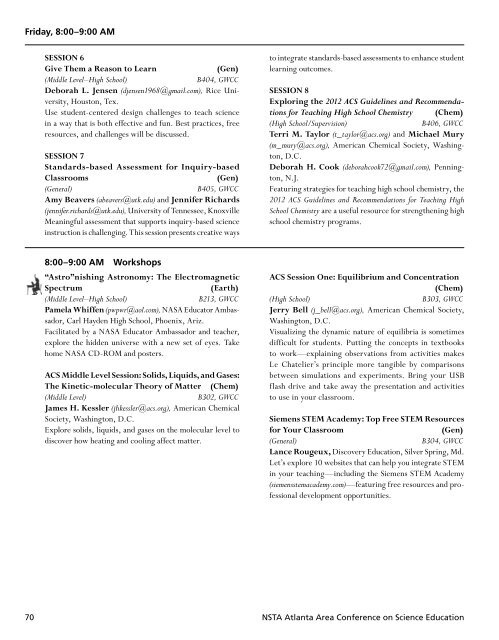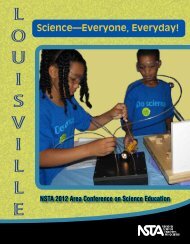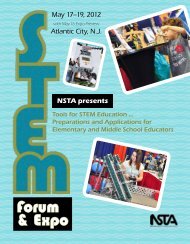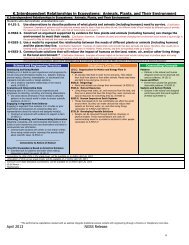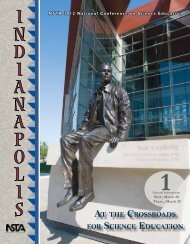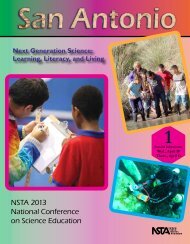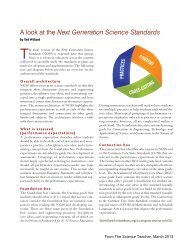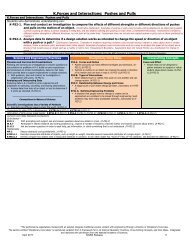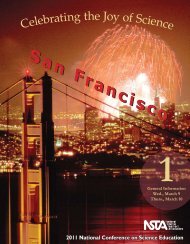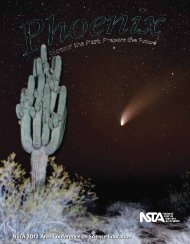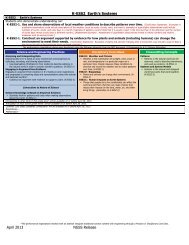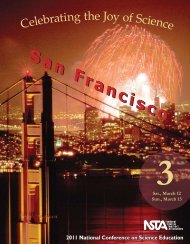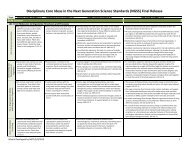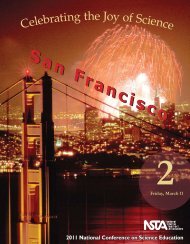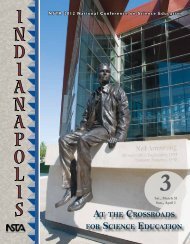Atlanta Conference Program
Atlanta Conference Program
Atlanta Conference Program
You also want an ePaper? Increase the reach of your titles
YUMPU automatically turns print PDFs into web optimized ePapers that Google loves.
Friday, 8:00–9:00 AM<br />
SESSION 6<br />
Give Them a Reason to Learn<br />
(Gen)<br />
(Middle Level–High School)<br />
B404, GWCC<br />
Deborah L. Jensen (djensen1968@gmail.com), Rice University,<br />
Houston, Tex.<br />
Use student-centered design challenges to teach science<br />
in a way that is both effective and fun. Best practices, free<br />
resources, and challenges will be discussed.<br />
SESSION 7<br />
Standards-based Assessment for Inquiry-based<br />
Classrooms<br />
(Gen)<br />
(General)<br />
B405, GWCC<br />
Amy Beavers (abeavers@utk.edu) and Jennifer Richards<br />
(jennifer.richards@utk.edu), University of Tennessee, Knoxville<br />
Meaningful assessment that supports inquiry-based science<br />
instruction is challenging. This session presents creative ways<br />
to integrate standards-based assessments to enhance student<br />
learning outcomes.<br />
SESSION 8<br />
Exploring the 2012 ACS Guidelines and Recommendations<br />
for Teaching High School Chemistry (Chem)<br />
(High School/Supervision)<br />
B406, GWCC<br />
Terri M. Taylor (t_taylor@acs.org) and Michael Mury<br />
(m_mury@acs.org), American Chemical Society, Washington,<br />
D.C.<br />
Deborah H. Cook (deborahcook72@gmail.com), Pennington,<br />
N.J.<br />
Featuring strategies for teaching high school chemistry, the<br />
2012 ACS Guidelines and Recommendations for Teaching High<br />
School Chemistry are a useful resource for strengthening high<br />
school chemistry programs.<br />
8:00–9:00 AM Workshops<br />
“Astro”nishing Astronomy: The Electromagnetic<br />
Spectrum<br />
(Earth)<br />
(Middle Level–High School)<br />
B213, GWCC<br />
Pamela Whiffen (pwpwr@aol.com), NASA Educator Ambassador,<br />
Carl Hayden High School, Phoenix, Ariz.<br />
Facilitated by a NASA Educator Ambassador and teacher,<br />
explore the hidden universe with a new set of eyes. Take<br />
home NASA CD-ROM and posters.<br />
ACS Middle Level Session: Solids, Liquids, and Gases:<br />
The Kinetic-molecular Theory of Matter (Chem)<br />
(Middle Level)<br />
B302, GWCC<br />
James H. Kessler (jhkessler@acs.org), American Chemical<br />
Society, Washington, D.C.<br />
Explore solids, liquids, and gases on the molecular level to<br />
discover how heating and cooling affect matter.<br />
ACS Session One: Equilibrium and Concentration<br />
(Chem)<br />
(High School)<br />
B303, GWCC<br />
Jerry Bell (j_bell@acs.org), American Chemical Society,<br />
Washington, D.C.<br />
Visualizing the dynamic nature of equilibria is sometimes<br />
difficult for students. Putting the concepts in textbooks<br />
to work—explaining observations from activities makes<br />
Le Chatelier’s principle more tangible by comparisons<br />
between simulations and experiments. Bring your USB<br />
flash drive and take away the presentation and activities<br />
to use in your classroom.<br />
Siemens STEM Academy: Top Free STEM Resources<br />
for Your Classroom<br />
(Gen)<br />
(General)<br />
B304, GWCC<br />
Lance Rougeux, Discovery Education, Silver Spring, Md.<br />
Let’s explore 10 websites that can help you integrate STEM<br />
in your teaching—including the Siemens STEM Academy<br />
(siemensstemacademy.com)—featuring free resources and professional<br />
development opportunities.<br />
70 NSTA <strong>Atlanta</strong> Area <strong>Conference</strong> on Science Education


